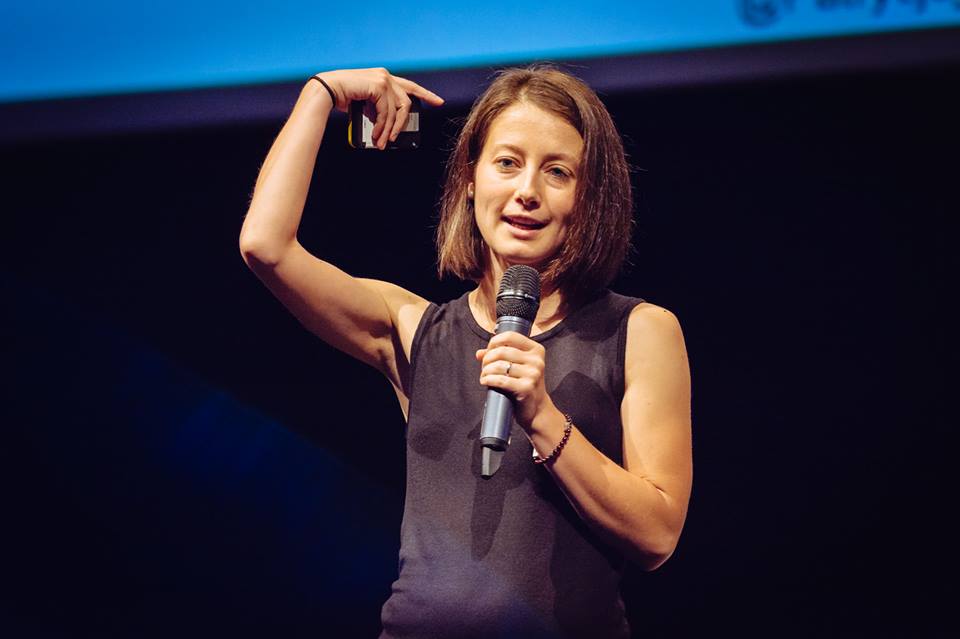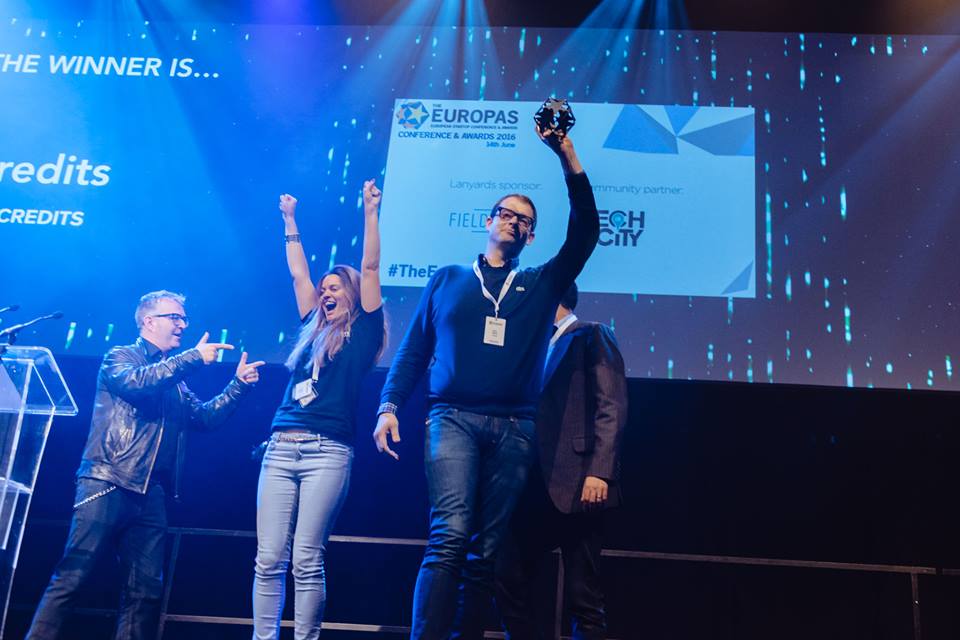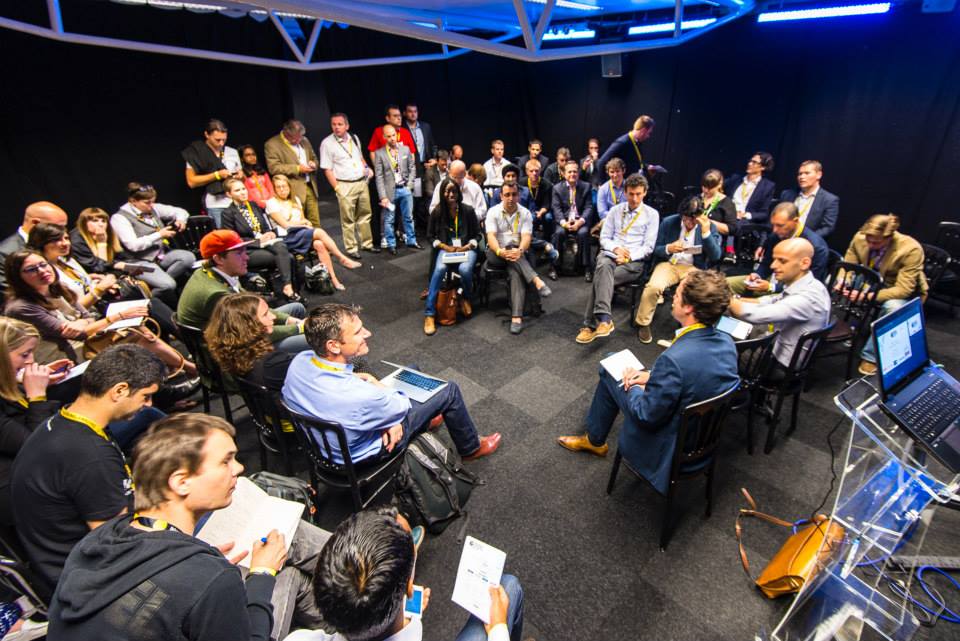funding
Auto Added by WPeMatico
Auto Added by WPeMatico
This year has been a rough one for Sphero. The Colorado-based toy robotics startup kicked off the year with dozens of layoffs, a result of tepid interest in its line of Disney-branded consumer products.
Here’s a little good news, however. The company has raised another $12 million, bringing its total up to around $119 million, according to Crunchbase. The latest round will go into helping shape the BB-8 maker into an education-first company.
“The recent round of funding has currently raised $12 million, and we anticipate at the time of final closing up to $20 million may be raised in total,” Sphero said in a statement provided to TechCrunch. Funding has/will come from existing and new investors and will be used for working capital as we engage in a larger strategy that focuses on the intersection of play and learning.”
It’s a tricky play, given how overcrowded the world of coding toys is at the moment, but Sphero has long been building out its play in the space, in tandem with its more consumer-focused offerings.
Following the success of its The Force Awakens BB-8 tie in, the company quadrupled down on its involvement with Disney’s accelerator, releasing high-tech toys based on Spider-Man and Lightning McQueen from Cars.
“[Education] is something we can actually own,” the company told me after the layoffs were revealed. “Where we do well are those experiences we can 100 percent own, from inception to go-to-market.”
Powered by WPeMatico
Prøhbtd, a startup that CEO Drake Sutton-Shearer said is designed to “build a bridge” between the cannabis industry and mainstream culture, is announcing that it has raised $8 million in Series A funding.
It’s not the only cannabis-focused digital media company out there; I wrote about the initial funding for Herb last year. But Sutton-Shearer argued that Prøhbtd is creating premium content with a unique voice.
For one thing, he said Prøhbtd’s isn’t focused exclusively on cannabis. Instead, the goal is to create a diverse slate of lifestyle- and culture-related content, with cannabis as the hook.
Take, for example, Edibles, a video series hosted by Birdie Harrelson (niece of Woody Harrelson) — the series includes recipes for creating cannabis-infused baked goods, but as Sutton-Shearer put it, when each episode opens, “She’s not talking about weed, she’s going to bakeries.”
The company says that its video content (which is available on both the Prøhbtd website and on devices like Apple TV and Roku) saw 21 million views in May, with an average view time of 3 minutes and 45 seconds.

Sutton-Shearer said one of his priorities is forging “mainstream partnerships” like Prøhbtd’s deal with Advertising Week. The company also works with more than 60 cannabis brands — not just on branded videos and sponsorships, but more broadly on product development, design and marketing.
Asked whether this creates a potential conflict with the editorial side of the business, Sutton-Shearer pointed out that plenty of other digital media companies (like BuzzFeed and Vice) run their own branded content studios.
“Today’s younger consumer, I don’t think they really care that much whether something’s branded or not,” he said. “They do want to know if it’s entertaining and thoughtful.”
Prøhbtd had previously raised $4 million in seed funding from investors including actor/musician Donald Glover. The new round was led by Serruya Private Equity, The Delavaco Group and Cresco Capital.
“We’ve seen every media opportunity in the cannabis industry but none of them compare to what the team at PRØHBTD has built,” said Serruya Private Equity’s Aaron Serruya in the funding announcement. “We expect great things from the company and we’re excited to support the team’s global vision.”
Speaking of that vision, Sutton-Shearer said Prøhbtd is exploring international opportunities, including in Canada, Australia and Latin America, with plans for a Canadian public offering.
“We’re very strategically looking at the rest of the world, but there’s still a lot to be done in the U.S.,” Sutton-Shearer said.
Powered by WPeMatico
Panda has built the next silly social feature Snapchat and Instagram will want to steal. Today the startup launches its video messaging app that fills the screen with augmented reality effects based on the words you speak. Say “Want to get pizza?” and a 3D pizza slice hovers by your mouth. Say “I wear my sunglasses at night” and suddenly you’re wearing AR shades with a moon hung above your head. Instead of being distracted by having to pick effects out of a menu, they appear in real-time as you chat.
Panda is surprising and delightful. It’s also a bit janky, created by a five person team with under $1 million in funding. Building a video chat app user base from scratch amidst all the competition will be a struggle. But even if Panda isn’t the app to popularize the idea, it’s invented a smart way to enhance visual communication that blends into our natural behavior.

It all started with a trippy vision. Panda’s 18-year-old founder Daniel Singer had built a few failed apps and was working as a product manager at peer-to-peer therapy startup Sensay in LA. When Alaska Airlines bought Virgin, Singer scored a free flight and came to see his buddy Arjun Sethi, an investor at Social Capital in SF. That’s when suddenly “I’m hallucinating that as I’m talking the things I’m saying should appear” he tells me. Sethi dug the idea and agreed to fund a project to build it.

Panda founder Daniel Singer
Meanwhile, Singer had spent the last 6 years FaceTiming almost every day. He loved telling stories with his closest friends, yet Apple’s video chat protocol had fallen behind Snapchat and Instagram when it came to creative tools. So a year ago he raised $850,000 from Social Capital and Shrug Capital plus angels like Cyan (Banister) and Secret’s David Byttow. Singer set out to build Panda to combine FaceTime’s live chat with Snapchat’s visual flare triggered by voice.
But it turns out, “video chat is hard” he admits. So his small team settled for letting users send 10-second-max asynchronous video messages. Panda’s iOS app launched today with about 200 different voice activated stickers from footballs to sleepy Zzzzzs to a “&’%!#” censorship bar that covers your mouth when you swear. Tap them and they disappear, and soon you’ll be able to reposition them. As you trigger the effects for the first time, they go into a trophy case that gamifies voice experimentation.
Panda is fun to play around with yourself even if you aren’t actively messaging friends, which is reminiscent of how teens play with Snapchat face filters without always posting the results. The speech recognition effects will make a lot more sense if Panda can eventually succeed at solving the live video chat tech challenge. One day Singer imagines Panda making money by selling cosmetic effects that make you more attractive or fashionable, or offering sponsored effects so when you say “gym”, the headband that appears on you is Nike branded.
Unfortunately, the app can be a bit buggy and effects don’t always trigger, fooling you that you aren’t saying the right words. And it could be tough convincing buddies to download another messaging app, let alone turn it into a regular habit. Apple is also adding a slew of Memoji personalized avatars and other effects to FaceTime in its upcoming iOS 12.
Panda does advance one of technology’s fundamental pursuits: taking the fuzzy ideas in your head and translating them into meaning for others in clearer ways than just words can offer. It’s the next wave of visual communication that doesn’t require you to break from the conversation.
When I ask why other apps couldn’t just copy the speech stickers, Singer insisted “This has to be voice native.” I firmly disagree, and can easily imagine his whole app becoming just a single filter in Snapchat and Instagram Stories. He eventually acquiesced that “It’s a new reality that bits and pieces of consumer technology get traded around. I wouldn’t be surprised if others think it’s a good idea.”

It’s an uphill battle trying to disrupt today’s social giants, who are quick to seize on any idea that gives them an edge. Facebook rationalizes stealing other apps’ features by prioritizing whatever will engage its billions of users over the pride of its designers. Startups like Panda are effectively becoming outsourced R&D departments.
Still, Panda pledges to forge on (though it might be wise to take a buyout offer). Singer gets that his app won’t cure cancer or “make the world a better place” as HBO’s Silicon Valley has lampooned. “We’re going to make really fun stuff and make them laugh and smile and experience human emotion” he concludes. “At the end of the day, I don’t think there’s anything wrong with building entertainment and delight.”
Powered by WPeMatico
Logtrust is now known as Devo in one of the cooler name changes I’ve seen in a long time. Whether they intended to pay homage to the late 70s band is not clear, but investors probably didn’t care, as they gave the data operations startup a bushel of money today.
The company now known as Devo announced a $25 million Series C round led by Insight Venture Partners with participation from Kibo Ventures. Today’s investment brings the total raised to $71 million.
The company changed its name because it was about much more than logs, according to CEO Walter Scott. It offers a cloud service that allows customers to stream massive amounts of data — think terabytes or even petabytes — relieving the need to worry about all of the scaling and hardware requirements processing this amount of data would require. That could be from logs from web servers, security data from firewalls or transactions taking place on backend systems, as some examples.
The data can live on prem if required, but the processing always gets done in the cloud to provide for the scaling needs. Scott says this is about giving companies this ability to process and understand massive amounts of data that previously was only in reach of web scale companies like Google, Facebook or Amazon.
But it involves more than simply collecting the data. “It’s the combination of us being able to collect all of that data together with running analytics on top of it all in a unified platform, then allowing a very broad spectrum of the business [to make use of it],” Scott explained.

Devo dashboard. Photo: Devo
Devo sees Sumo Logic, Elastic and Splunk as its primary competitors in this space, but like many startups they often battle companies trying to build their own systems as well, a difficult approach for any company to take when you are dealing with this amount of data.
The company, which was founded in Spain is now based in Cambridge, Massachusetts, and has close to 100 employees. Scott says he has the budget to double that by the end of the year, although he’s not sure they will be able to hire that many people that rapidly
Powered by WPeMatico
PlayVS, the startup building esports infrastructure at the high school level, has today announced the close of a $15 million Series A funding round. The financing was led by New Enterprise Associates, with participation from existing investor Science, as well as CrossCut Ventures, Coatue Management, Cross Culture Ventures, the San Francisco 49ers, Nas, Dollar Shave Club founder Michael Dubin, Twitch cofounder Kevin Lin, and others.
PlayVS first publicly launched out of the LA-based Science startup studio in April. The company partnered with the NFHS, the equivalent of the NCAA for high school-level sports, to build out leagues, rules and more around high school esports.
Most high school sports are governed by the NFHS, which writes the rules, hires referees, schedules seasons and determines the format of playoffs and state championships. That same infrastructure might carry over from one high school sport to another, but esports represents a new challenge for the NFHS.
PlayVS brings to market a platform that schedules games, helps schools hold try-outs and form teams, and pulls in stats real-time from games thanks to partnerships with game publishers.
In October, PlayVS will launch its inaugural season, bringing organized esports to more than 18 states and approximately 5 million students across 5,000 high schools.
As esports continue to grow, colleges and professional organizations have already started investing in scholarship programs and pro teams respectively. But whereas other high-level teams look at high school athletes for recruiting, the same infrastructure has not yet been put into place for esports.
PlayVS wants to change that. The new round of funding will go towards expanding the product and the team to eventually put PlayVS in every high school across the country. The company has yet to announce which schools will participate and which games will be available during the first season, but PlayVS has confirmed that the games will be PC-based and will come from the Multiplayer Online Battle Arena, Fighting and Sports genres.
Powered by WPeMatico
Machine learning is one of those buzzwords that nearly every tech company likes to throw around nowadays — but according to Lukas Biewald, it represents a genuinely new approach to programming.
“Software has eaten a lot of the world, and machine learning is eating software,” Biewald said.
In his view, there are “fundamental” differences between the two approaches: “One important difference is if all you have is the code you used to train the program, you don’t really know what happened … If I had all the code that was used to train a self-driving car algorithm but I don’t have the data, I don’t know what went down.”
Along with Chris Van Pelt, Biewald previously founded CrowdFlower (now known as Figure Eight), which launched nearly a decade ago at the TechCrunch 50 conference, and which has created tools for training artificial intelligence.
Biewald (whom I’ve known since college) and Van Pelt, plus former Google engineer Shawn Lewis, have now started a new company called Weights & Biases to build new tools for machine learning developers. They’ve also raised $5 million in Series A funding from Trinity Ventures and Bloomberg Beta.
“Artificial Intelligence has so much potential, but few companies are implementing it yet because the development process is too complicated for all but a small number of highly trained engineers,” said Trinity’s Dan Scholnick, who’s joining the startup’s board of directors. (Scholnick previously backed CrowdFlower.) “W&B aims to dramatically streamline the machine learning software development process so that AI benefits can be unlocked across industries and no longer restricted to the few firms able to hire extremely skilled and extraordinarily expensive AI developers today.”

The eventual goal is to create a whole suite of development tools, but Weights & Biases’ first product records and visualizes the process of training a machine learning algorithm. Biewald explained that this makes it possible for developers to go back and see what they were doing, say, a month ago and to share that information with teammates. And it’s already being used by the nonprofit research company OpenAI.
Biewald added that when he talked to his friends in the field about their biggest problems, this was the first thing that came up. That’s how he hopes to approach future products as well — working with developers to figure out what they really need.
“I don’t want to help with the hype,” he said. “I want to help with the real problems that really get in the way … to make this stuff actually work.”
Biewald also offered more details about his vision for the company in a blog post:
You can’t paint well with a crappy paintbrush, you can’t write code well in a crappy IDE, and you can’t build and deploy great deep learning models with the tools we have now. I can’t think of any more important goal than changing that.
Powered by WPeMatico
GUN is an open-source decentralized database service that allows developers to build fast peer-to-peer applications that will work, even when their users are offline. The company behind the project (which should probably change its name and logo…) today announced that it has raised just over $1.5 million in a seed round led by Draper Associates. Other investors include Salesforce’s Marc Benioff through Aloha Angels, as well as Boost VC, CRCM and other angel investors.
As GUN founder Mark Nadal told me, it’s been about four years since he started working on this problem, mostly because he saw the database behind his early projects as a single point of failure. When the database goes down, most online services will die with it, after all. So the idea behind GUN is to offer a decentralized database system that offers real-time updates with eventual consistency. You can use GUN to build a peer-to-peer database or opt for a multi-master setup. In this scheme, a cloud-based server simply becomes another peer in the network (though one with more resources and reliability than a user’s browser). GUN users get tools for conflict resolution and other core features out of the box and the data is automatically distributed between peers. When users go offline, data is cached locally and then merged back into this database once they come online.

Nadal built the first prototype of GUN back in 2014, based on a mix of Firebase, MySQL, MongoDB and Cassandra. That was obviously a bit of a hack, but it gained him some traction among developers and enough momentum to carry the idea forward.
Today, the system has been used to build everything from a decentralized version of Reddit (which isn’t currently working) that can handle a few million uniques per month and a similarly decentralized YouTube clone.
Nadal also argues that his system has major speed advantages over some of the incumbents. “From our initial tests we find that for caching, our product is 28 times faster than Redis, MongoDB and others. Now we are looking for partnerships with companies pioneering technology in gaming, IoT, VR and distributed machine learning,” he said.
The Dutch Navy is already using it for some IoT services on its ships and a number of other groups are using it for their AI/ML services. Because its use cases are similar to that of many blockchain projects, Nadal is also looking at how he can target some of those developers to take a closer look at GUN.
Powered by WPeMatico
Excited to announce that this year’s The Europas Unconference & Awards is shaping up! Our half day Unconference kicks off on 3 July, 2018 at The Brewery in the heart of London’s “Tech City” area, followed by our startup awards dinner and fantastic party and celebration of European startups!
The event is run in partnership with TechCrunch, the official media partner. Attendees, nominees and winners will get deep discounts to TechCrunch Disrupt in Berlin, later this year.
The Europas Awards are based on voting by expert judges and the industry itself. But key to the daytime is all the speakers and invited guests. There’s no “off-limits speaker room” at The Europas, so attendees can mingle easily with VIPs and speakers.
What exactly is an Unconference? We’re dispensing with the lectures and going straight to the deep-dives, where you’ll get a front row seat with Europe’s leading investors, founders and thought leaders to discuss and debate the most urgent issues, challenges and opportunities. Up close and personal! And, crucially, a few feet away from handing over a business card. The Unconference is focused into zones including AI, Fintech, Mobility, Startups, Society, and Enterprise and Crypto / Blockchain.
We’ve confirmed 10 new speakers including:

Eileen Burbidge, Passion Capital
Carlos Eduardo Espinal, Seedcamp

Richard Muirhead, Fabric Ventures

Sitar Teli, Connect Ventures

Nancy Fechnay, Blockchain Technologist + Angel
George McDonaugh, KR1
Candice Lo, Blossom Capital

Scott Sage, Crane Venture Partners

Andrei Brasoveanu, Accel

Tina Baker, Jag Shaw Baker
We’d love for you to ask your friends to join us at The Europas – and we’ve got a special way to thank you for sharing.
Your friend will enjoy a 15% discount off the price of their ticket with your code, and you’ll get 15% off the price of YOUR ticket.
That’s right, we will refund you 15% off the cost of your ticket automatically when your friend purchases a Europas ticket.
So you can grab tickets here.
Public Voting is still humming along. Please remember to vote for your favourite startups!
Awards by category:
Hottest Media/Entertainment Startup
Hottest E-commerce/Retail Startup
Hottest Marketing/AdTech Startup
Hottest Enterprise, SaaS or B2B Startup
Hottest Platform Economy / Marketplace
Hottest Cyber Security Startup
Hottest Internet of Things Startup
Fastest Rising Startup Of The Year
Hottest GreenTech Startup of The Year
Best Angel/Seed Investor of the Year
Hottest VC Investor of the Year
Hottest Blockchain/Crypto Startup Founder(s)
Hottest Blockchain Protocol Project
Hottest Corporate Blockchain Project
Hottest Blockchain ICO (Europe)
Hottest Financial Crypto Project
Hottest Blockchain for Good Project
Hottest Blockchain Identity Project
Hall Of Fame Award – Awarded to a long-term player in Europe
The Europas Grand Prix Award (to be decided from winners)
The Awards celebrates the most forward thinking and innovative tech & blockchain startups across over some 30+ categories.
Startups can apply for an award or be nominated by anyone, including our judges. It is free to enter or be nominated.
Instead of thousands and thousands of people, think of a great summer event with 1,000 of the most interesting and useful people in the industry, including key investors and leading entrepreneurs.
• No secret VIP rooms, which means you get to interact with the Speakers
• Key Founders and investors speaking; featured attendees invited to just network
• Expert speeches, discussions, and Q&A directly from the main stage
• Intimate “breakout” sessions with key players on vertical topics
• The opportunity to meet almost everyone in those small groups, super-charging your networking
• Journalists from major tech titles, newspapers and business broadcasters
• A parallel Founders-only track geared towards fund-raising and hyper-networking
• A stunning awards dinner and party which honors both the hottest startups and the leading lights in the European startup scene
• All on one day to maximise your time in London. And it’s PROBABLY sunny!

That’s just the beginning. There’s more to come…

Interested in sponsoring the Europas or hosting a table at the awards? Or purchasing a table for 10 or 12 guest or a half table for 5 guests? Get in touch with:
Petra Johansson
Petra@theeuropas.com
Phone: +44 (0) 20 3239 9325

Powered by WPeMatico
Right on the heels of launching its concierge service Hooch Black, Hooch announced today that it has raised $5 million in seed funding.
The company’s basic subscription of $9.99 gets you one free drink per day from a variety of partner bars and restaurants. Hooch Black (which you have to apply for, and which costs $295 per year) adds hotel deals, concierge service and other perks on top.
Even though Hooch had already raised $2.75 million in two pre-seed rounds, co-founder and CEO Lin Dai said it was more important to bring on strategic investors than it was to raise a lot of money: “We feel like the most important thing for our business is really the relationships.”
After all, he said the hospitality industry is controlled by “a few key companies,” so success is determined by working with those companies — it’s not a situation where someone can just beat you by outspending you.
The funding was led by Revelis Capital Group and Blue Scorpion Investments, with participation from Access Industries Holdings, Warner Music Group (Dai said that Hooch will be working with Warner Music on content, events and promotions), FJ Labs, Diesel CEO Stefano Rosso, former Comcast CTO Sree Kotay and others.
At the same time, the company is expanding its advisory board to include Bob Hurst (previously vice chairman of Goldman Sachs), Bonin Bough (former chief media and ecommerce officer at Mondelez) and Teymour Farman-Farmaian (previously CMO and CRO at Spotify and now managing director of Bitcoin wallet company Xapo).
Dai also said Hooch is preparing to launch its blockchain initiative this summer. What does blockchain have to do with free drinks? Well, Dai didn’t go into detail, but he suggested that by launching its own cryptocurrency token, Hooch could work with partners to create a “decentralized model for consumer rewards.”
Looking ahead, Dai said that Hooch might raise a “proper” Series A in 12 to 18 months, though he expects to reach profitability before then.
“At that point, we will have already built the moat around us with exclusive deals with all the top hospitality and experiential players,” he said. “That would be the appropriate time for us, if needed, to go back to a traditional round of funding.”
Powered by WPeMatico
In March, the female-led media company and newsletter provider theSkimm reported it was raising a $12 million Series C from Google Ventures and Spanx founder Sara Blakely, along with several existing investors. Today, the company is confirming its Series C round has closed with a number of new, mostly female investors joining — including big names like Shonda Rhimes and Tyra Banks.
Variety was the first to report the news of the new investors.
The Series C’s additional investors include former TV journalist Willow Bay, now dean at the USC Anneberg School for Communication and Journalism; Jesse Draper of Halogen Ventures; Shonda Rhimes; founder and CEO of GingerBread Capital, Linnea Roberts; CEO of ELY Capital, Hope Taitz; as well as the Goldman Sachs Group, Inc.; and Michael Karsch of Juice Press.
Earlier Series C investors included GV (formerly Google Ventures); Spanx founder Sara Blakely; plus former lead investors 21st Century Fox, RRE Ventures and Homebrew Ventures.
TheSkimm began its life as an email newsletter, founded by former TV news producers Carly Zakin and Danielle Weisberg. The newsletter targets millennial women who want an easy way to keep up with the key news of the day. What makes the product so appealing is how it’s written in a conversational tone, making it accessible to a wide audience who often finds reading the news a dreary but necessary chore. Mixed in with its highlights from key U.S., political and international news are samplings of stories from pop culture and the entertainment industry, which gives the newsletter a bit of a palate cleanser — something that’s much appreciated these days.
That newsletter has now grown to around 7 million subscribers, the company says. (This is the same number it reported in March.)
The company has also expanded to other products since its launch, including a $2.99 per month subscription-based app for keeping up with upcoming news and televised events, a podcast, as well as original videos for YouTube and Facebook Watch via its production arm, Skimm Studios.
Its video offerings include Skimm’d with…” and “Get Off the Couch” for Facebook, and digital series “Sip n’ Skimm,” which landed an interview with Canadian Prime Minister Justin Trudeau, followed by a discussion with House Speaker Paul Ryan assessing the proposed GOP tax plan.
Meanwhile, theSkimm’s podcast, “Skimm’d from The Couch,” reached No. 1 on Apple Podcasts hours after its launch.
The company generates revenue from a variety of sources, including its app subscriptions, native ads, affiliate, content licensing and distribution, theSkimm notes in an announcement. The company is not offering revenue details, however.
“As a female led and founded company, we are excited to have the opportunity to bring such an impressive and dynamic group of female investors into theSkimm fold,” co-founders and co-CEOs Zakin and Weisberg, said in a statement. “With a majority of our audience being female, it’s vital to the success of our business to involve women at every single level, and that includes our investors. With their added perspective and resources, we look forward to this next chapter in our company’s history.”
Banks added she had a personal appreciation for the product, in addition to her desire to support female entrepreneurs.
“Going from one business meeting, to the next studio set, and as a new mama, it’s more difficult than ever to stay up to date on the day’s headlines,” the media mogul said. “theSkimm created a media platform that works seamlessly with on-the-go lifestyles. As a fervent supporter of trailblazing female-led businesses, I am thrilled to be a part of the next phase of theSkimm’s development,” Banks said.
The company didn’t offer many specifics in terms of how it plans to utilize the additional capital, but told us that it plans to “continue evolving the brand” and grow its product offerings — both premium and free. One of its plans involves expanding its No Excuses political-engagement campaign, reports Variety, which registered 110,000 U.S. voters.
New York-based theSkimm has 72 full-time employees and has raised $29 million to date.
Powered by WPeMatico